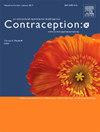从政策到实践:世卫组织避孕药具使用医疗资格标准(MEC)DMPA-IM 指南修订后的 ECHO 试验经验
Q2 Medicine
引用次数: 0
摘要
目标2017年,世界卫生组织(WHO)针对HIV感染高风险女性的醋酸甲羟孕酮肌肉注射剂(DMPA-IM)避孕类别医疗资格标准(MEC)从MEC类别1改为2。我们评估了在 "避孕选择与艾滋病结果证据"(ECHO)试验中通报这一类别变化对妇女的影响。研究设计ECHO 在斯瓦蒂尼、肯尼亚、南非和赞比亚进行。妇女被随机(1:1:1)分配到DMPA-IM、左炔诺孕酮(LNG)植入或铜宫内节育器(Cu IUD)。我们比较了停用 DMPA-IM 的危险性,并评估了 MEC 类别变更前后的性行为和 DMPA-IM 满意度。结果 DMPA-IM 使用者在 MEC 变更后停用的危险性降低(危险比 0.37;95% CI = 0.26-0.52,p <0.001)。在性行为结果方面,没有观察到改变《多指标类集调查》有影响的证据。有证据表明,在改变 MEC 后,妇女对 DMPA-IM 的不满意度立即增加,与改变 MEC 前相比,报告得分更高(更不满意)的几率增加了 1.38(95% CI = 1.11-1.72)。启示虽然我们在本分析中没有发现任何证据表明 MEC 的改变对改变类别后妇女的性行为结果产生了影响,但就避孕方法可能存在的理论风险提供咨询仍是一项重要的医学伦理标准。鉴于将研究结果转化为指南并进一步转化为咨询信息所面临的挑战,有必要对临床指南的实施情况进行评估,以了解实施效果并监测预期影响和意外后果。本文章由计算机程序翻译,如有差异,请以英文原文为准。
From policy to practice: Experiences from the ECHO trial following revisions of the WHO medical eligibility criteria for contraceptive use (MEC) guidance on DMPA-IM
Objectives
In 2017, the World Health Organization (WHO) medical eligibility criteria (MEC) for contraception category for intramuscular depot medroxyprogesterone acetate (DMPA-IM) was changed from MEC category 1 to 2 for women at high risk of HIV acquisition. We assessed the impact of communicating this category change among women in the Evidence for Contraceptive options and HIV Outcomes (ECHO) trial.
Study design
ECHO was conducted in eSwatini, Kenya, South Africa and Zambia. Women were randomized (1:1:1) to DMPA-IM, levonorgestrel (LNG) implant or copper intrauterine device (Cu IUD). We compared the hazards of DMPA-IM discontinuation and assessed sexual behavior and DMPA-IM satisfaction before and after MEC category change.
Results
In DMPA-IM users there was a decrease in the hazards of discontinuation after the MEC change (hazard ratio 0.37; 95% CI = 0.26–0.52, p < 0.001). No evidence of an effect of the MEC change was observed in sexual behaviour outcomes. There was some evidence of an increase in disatisfaction with DMPA-IM immediately after the MEC change, with the odds of women reporting a higher score (more dissatisfied) increasing by 1.38 compared with before the MEC change (95% CI = 1.11–1.72).
Conclusions
While counseling on possible theoretical risks associated with contraceptive methods in the MEC is an important medical ethical standard, in this study it did not adversely impact continuation or sexual behavior, while there was some evidence on increase in dissatisfaction. There is however a need to monitor how changes in MEC categories are implemented.
Implications
Although we found no evidence in this analysis of an effect of the MEC change on any of the sexual behavioral outcomes among women after the change in category, it is still an important medical ethical standard to counsel on possible theoretical risks associated with contraceptive methods. Given the challenges of translating research findings to guidelines and further to counseling messages, evaluation of clinical guidelines implementation is necessary to understand the effects of implementation and to monitor both intended impacts and unintended consequences.
求助全文
通过发布文献求助,成功后即可免费获取论文全文。
去求助
来源期刊

Contraception: X
Medicine-Obstetrics and Gynecology
CiteScore
5.10
自引率
0.00%
发文量
17
审稿时长
22 weeks
 求助内容:
求助内容: 应助结果提醒方式:
应助结果提醒方式:


